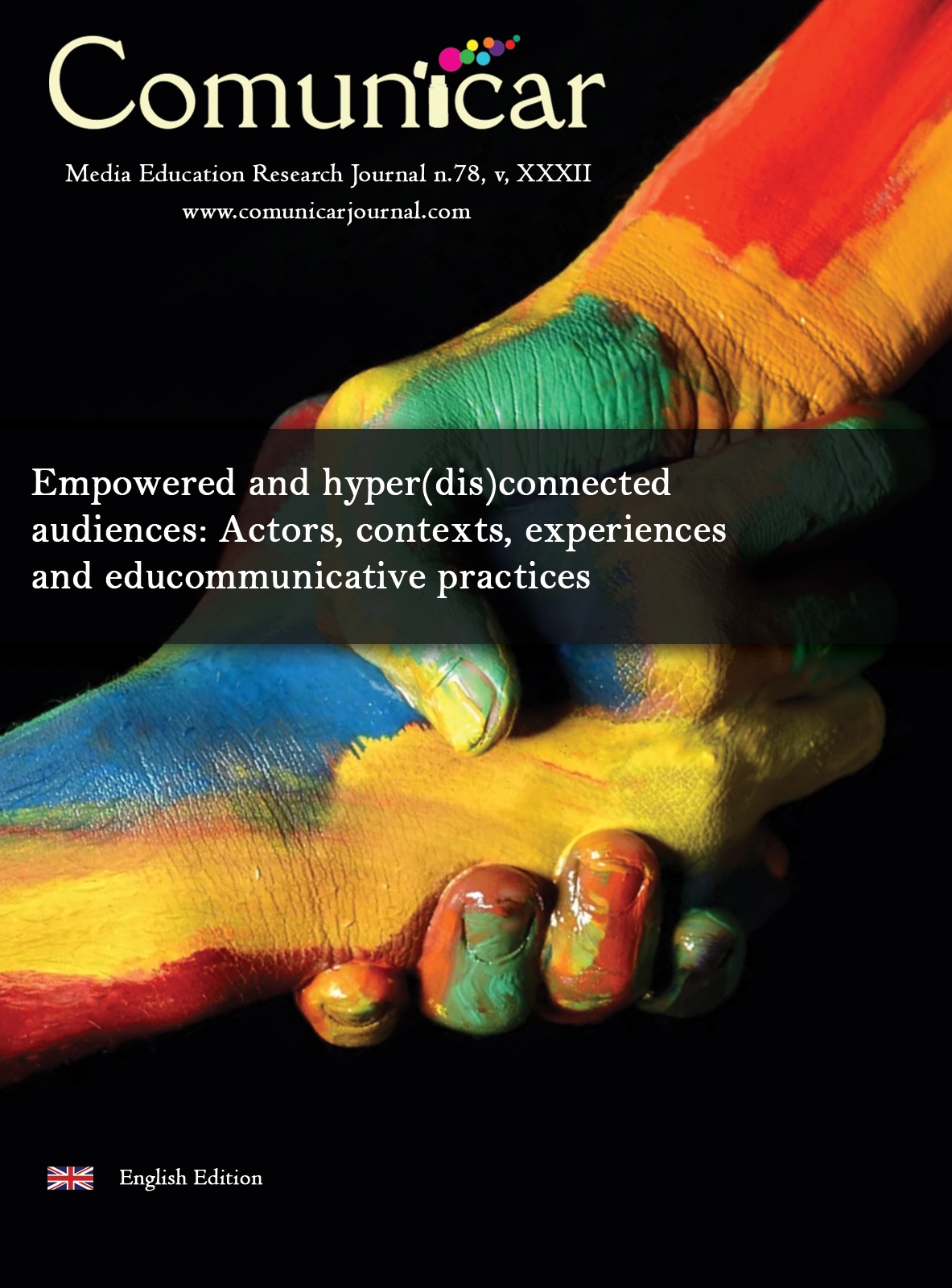在难民危机中反对仇恨言论的新闻游戏
IF 5.1
1区 文学
Q1 COMMUNICATION
引用次数: 14
摘要
难民危机一直是仇恨言论的沃土,这些言论将移民描绘成危险的威胁,并通过社交网络传播。虽然媒体在不知不觉中助长了这些种族主义信息的扩散,但一些媒体的反应是将其传统的新闻活动扩展到创造新闻游戏,以寻找解决这种情况的新方法。本研究使用基于多模态定性分析(信息性和叙述性)的方法,考察了由领先媒体开发的五款新闻游戏的使用情况。结果显示,新闻游戏玩家可以获得真实的信息,就像其他新闻类型的情况一样,并利用其他类型的个人和情感信息(环境,感受,家庭关系)。这些数据并不是孤立出现的,而是整合到游戏体验中。该研究通过确定构成样本的新闻游戏的信息水平和沉浸感之间的互动,以及它们的不同层次得出结论:让玩家有机会在故事中做出更重要的决定,从而引入细微差别,促进对难民的同情;然而,新闻游戏在游戏体验上的更大自由度使它们远离了传统的信息模式,并可能涉及到更大的扭曲它们所寻求推广的理念的风险。“难民危机”是指“难民危机”、“难民危机”、“难民危机”、“难民危机”、“难民危机”、“难民危机”、“难民危机”、“难民危机”、“难民危机”、“难民危机”、“难民危机”、“难民危机”、“难民危机”。Los medios de comunicación han contribudo inconentemente a su difusión, unique algunos han acaconado ampliando su activida periodística传统的a la creación de新闻游戏para buscar nuevas formas de contrararstar效应de estos discourse。Esta investigación分析cinco新闻游戏desarrollados por medios de comunicación de referencia a partipartia de una metodología basada en un análisis多模式de carácter定性(信息性和ludo-叙事)。Los resultados muestran que el jugador de newsgames tigador tigador de newsgames tigador información veraz, como en otros formatos periodísticos, pero tamtamen disone de otrotipo de información más próxima y emotional(环境,情感,vínculos familiares)。“我们的数据不存在,我们的数据不存在,我们的数据不存在,我们的经验不存在。”La investigación结论identificando La interacción entre información e inmersión de los newsgames que componen La muestra, así como su diente gradación: unmayor control del jugador dentro de La historia permit介绍资料que favoen La empatía con los refugiados。在过去的一段时间里,la mayor libertad、la expericia de juego、la newsgames、la aleja del modelo informativo clásico、la mayor riesgo de distorsión、la idea que的意图捍卫者。本文章由计算机程序翻译,如有差异,请以英文原文为准。
Newsgames against hate speech in the refugee crisis
The refugee crisis has been a fertile ground for hate speech that has portrayed migrants as a dangerous threat and has been spread through social networks. While the media have unconsciously contributed to the proliferation of these racist messages, some have reacted by extending their traditional journalistic activity to the creation of newsgames to find new ways of addressing the situation. This study examines the use of five newsgames developed by leading media outlets using a methodology based on a multimodal qualitative analysis (informative and ludonarrative). The results showed that newsgames players have access to truthful information, as is the case for other journalistic genres, and draw on other types of personal and emotional information (circumstances, feelings, family ties). These data did not appear in isolation but integrated into the gaming experience. The study concludes by identifying the interaction between the levels of information and immersion of the newsgames that make up the sample, as well as their different gradation: giving the player the opportunity to make more significant decisions within the story allows for the introduction of nuances that promote empathy towards refugees; however, greater freedom in the gaming experience in newsgames distances them from the classic informational model and may involve a greater risk of distortion of the ideas that they seek to promote.
La crisis de los refugiados ha sido el caldo de cultivo para unos discursos del odio, extendidos a través de las redes sociales, que presentan a los inmigrantes como un peligro y una amenaza. Los medios de comunicación han contribuido inconscientemente a su difusión, aunque algunos han reaccionado ampliando su actividad periodística tradicional a la creación de newsgames para buscar nuevas formas de contrarrestar el efecto de estos discursos. Esta investigación analiza cinco newsgames desarrollados por medios de comunicación de referencia a partir de una metodología basada en un análisis multimodal de carácter cualitativo (informativo y ludo-narrativo). Los resultados muestran que el jugador de newsgames tiene acceso a información veraz, como en otros formatos periodísticos, pero también dispone de otro tipo de información más próxima y emocional (circunstancias, sentimientos, vínculos familiares). Estos datos no aparecen de forma aislada, sino que se integran en la experiencia del juego. La investigación concluye identificando la interacción entre información e inmersión de los newsgames que componen la muestra, así como su diferente gradación: un mayor control del jugador dentro de la historia permite introducir matices que favorecen la empatía con los refugiados. Sin embargo, la mayor libertad en la experiencia de juego en los newsgames los aleja del modelo informativo clásico y puede implicar un mayor riesgo de distorsión de las ideas que intentan defender.
求助全文
通过发布文献求助,成功后即可免费获取论文全文。
去求助
来源期刊

Comunicar
Multiple-
CiteScore
10.10
自引率
5.40%
发文量
40
审稿时长
20 weeks
期刊介绍:
Comunicar specialized in educommunication: communication and education, ICT, audiences, new languages...; monographs specialized in current issues. Double format: printed and online; digitally, accessible in full text, free of charge, for the entire scientific community and researchers around the world. Coeditions printed in Spanish and English for the whole world. Published by Oxbridge Publishing House which collaborates with many international centres and universities.
 求助内容:
求助内容: 应助结果提醒方式:
应助结果提醒方式:


